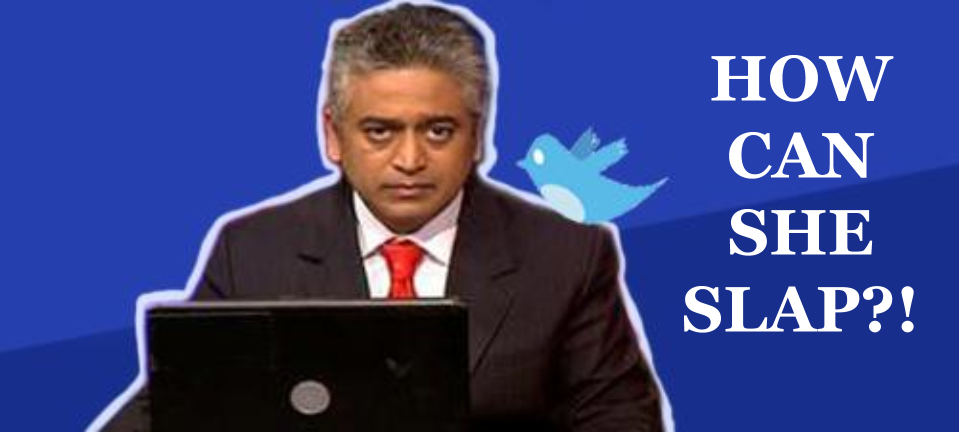A Case for Rajdeep Sardesai
Why Rajdeep Sardesai is better than his detractors

Modi made his presence felt in the US. Or may be he did more than that, courtesy a formidable support by his massive fanbase there. The overzealous incantation of stock slogans seemed like a tired continuation of the just concluded general elections. One at times felt like invoking archaic obscenity laws against the frenzied sloganeers who couldn't get enough of their blue-eyed-boy. But this mass hailing didn't go uncontested, for there were a few clutches of demonstrators who too wielded their anti-Modi placards. A blatant effrontery to the mob which meant business, the anti-Modi faction's protestations seemed like a squeal.
Equally overworked were the various contingents of journalists who were there to record every move of our prodigious PM. I wouldn't bother with the parody like commentary on the scoop-hunting-hacks, as it has already been done by their own peers in various weekend publications since, but the mad scamper for any brown-skinned primate who happened to have so much as an inkling of what the Mastodon-at-Madison was about, was beyond the understanding of anyone who still had his head firmly placed above his shoulders. The entire episode unravelled itself like a grand political drama, acquiring a farcical tone as it proceeded further.
A major constituent of the whole mise en scene was the sight of one of our more famous news anchors getting dirty with what was definitely a die hard modi supporter (read screamer) on the New York Street outside Madison Square Garden. Since the event took place, we have come across quite a number of glib talkers raising the issue of the lapse of ethics in the way Mr Rajdeep Sardesai handled himself. Some adduced that it was the journalist who landed the punch (or was it a slap?) and thus, aggravated the situation.
I feel inclined to take an issue with those slippery tongues, revelling in their characteristic skullduggery, by pointing out that what Mr Sardesai countered that day was a most egregious display of 'tyranny-of-majority'. Having watched the video like umpteen others I feel that it was sublunary but not sub-par of him to react the way he did.
What the journalist tried to do was to get a convulsing-with-enthusiasm pack of sloganeers to answer a few questions which they found were not to their tastes. It may be a matter of expedience, but not of what's right. It may be advised to move with caution while facing a profoundly dinning popular majority, and requiring them to answer a few unpopular questions, but not to be submissive, and be mob-handled.
What I really consider unethical was the abhorrently opportunistic haste with which TV channels came up with "specials" profiling Rajdeep Sardesai's entire career, as if brought off-the-rack. The most contemptuous of all was the one presented by Zee news, clearly calling Mr Sardesai an incompetent journalist who curried favour to get ahead, with Bhaskar Ghosh, former DG of DD. This takes us on a trip to the plunging depths in the standards of news-reporting. It was a classic case of ad hominem, inspired by a deliberate misreading of the event.
The commentary pronouncing Mr Sardesai a journalist with doubtful skills was totally uncalled for and completely out of context. Even if what the channel showed is taken as truth, still I don't see any anomaly in the way Mr Sardesai took charge of his career. Are they telling us that building rapport and seeking favours en route (as long as it doesn't demand you to be corrupt) is something to be ashamed of? I hope not, because just like every other profession, journalism, too, isn't strictly a merit based profession, and there's nothing in it to lose sleep over and make crass shows about.
Journalists are supposed to be working under an unannounced Hippocratic Oath, entailing certain code of Ethics, among those I am sure there isn't one dictating on how to behave while facing a vituperative and impervious crowd. Journalists are able to follow restraint and composure in pressing circumstances partly because they are protected by an unofficial immunity from being attacked, or threatened to be attacked, or any such contingency. But once such immunity is scuttled, as it was during the incident under question, then the only maxim which overbears all others is of 'promptitude'', a readiness to act, and act Mr Sardesai did.
Although he doesn't make the cut to the list of very few journalists who I admire, he's still better than some of those who indicted him. He is just a fine journalist with a street fighter's instinct, which I don't consider is a bad thing at all.



